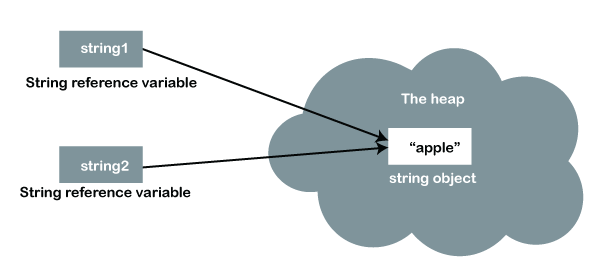Unalterable Strings: A Key Element in Ensuring Data Uniformity and Reliability
In the world of data monitoring, the importance of immutable strings can not be overemphasized. These imperishable series of characters play a pivotal duty in upholding the honesty and accuracy of info within systems. By preserving a state of immutability, information consistency is ensured, cultivating a structure of reliability upon which essential processes count. The idea of unalterable strings goes beyond simple technicality; it is a linchpin in the complex web of data governance. As we check out the benefits, application methods, and sensible applications of unalterable strings, a clearer photo arises of their indispensable nature in guarding the digital landscape.
The Principle of Unalterable Strings
Unalterable strings, a basic principle in programming, refer to strings that can not be modified as soon as they are produced. Fundamentally, as soon as a string value is designated, any type of operation that shows up to customize the string actually creates a new string. This immutability ensures information consistency and reliability in applications, as it prevents unforeseen changes to the initial information.
Advantages in Data Uniformity

Data consistency is vital in different elements of software advancement, including database administration, multi-threaded atmospheres, and dispersed systems (Why are strings immutable in Java?). Immutable strings add significantly to attaining this consistency by preventing data corruption as a result of simultaneous accessibility. In situations where multiple processes or strings engage with the same information all at once, immutable strings work as a secure against race conditions and synchronization issues
In addition, the immutability of strings streamlines debugging and screening processes. With unalterable strings, designers can rely on that once a string is established, it will certainly continue to be the same, making it easier to map the source of mistakes and guaranteeing that examination situations produce regular results. This reliability in information handling eventually causes more stable and durable applications.

Implementing Unalterable Strings
Guaranteeing the immutability of strings calls for a thoughtful technique to their application in software application advancement. One crucial technique is to design string classes in such a way that avoids modifications as soon as a string things is produced. By making strings immutable, designers can enhance information uniformity and integrity in their applications.
To execute unalterable strings successfully, designers should prefer creating brand-new string things instead of changing existing ones. This practice ensures that when a string is appointed a worth, it can not be altered. In addition, any operation that appears to change the string ought to produce a new string with the wanted changes as opposed to modifying the original.
In addition, utilizing immutable strings can streamline concurrency management in multi-threaded atmospheres. Considering that unalterable strings can not be transformed after creation, they can be securely shared amongst multiple threads without the risk of data corruption.
Function in Integrity Assurance
In software application growth, the utilization of immutable strings plays a crucial role in guaranteeing the dependability of information procedures. Immutable strings, when produced, can not be changed, making sure that the information they stand for continues to be consistent throughout the application's implementation. This immutability building provides a degree of assurance that the data being processed will certainly not be unintentionally transformed, bring about unforeseen outcomes or errors in the system.
By incorporating immutable strings into software application style, designers can improve the reliability of their applications by minimizing the risks connected with mutable information - Why are strings immutable in Java?. Unalterable strings assist in stopping data corruption or unplanned alterations, which can be specifically critical when dealing with sensitive information weblink or when information stability is extremely important
In addition, making use of immutable strings simplifies concurrent processing, as numerous threads can securely gain access to and share string data without the danger of one thread modifying the web content while another is reviewing it. This aspect adds considerably to the general integrity of the software program system, making sure foreseeable and constant behavior in data managing operations.
Applications and System Assimilation
The seamless integration of immutable strings right into different applications and systems is critical for making certain robust data uniformity and integrity across varied technological environments - Why are strings immutable in Java?. Unalterable strings play a vital function in enhancing the stability of data exchanges and communications within complicated see software program ecosystems. By integrating immutable strings right into applications, developers can alleviate the risks connected with data meddling, unauthorized alterations, and inadvertent modifications, thereby strengthening the overall protection position of the system
In the context of system assimilation, unalterable strings function as a fundamental aspect for developing protected communication networks and helping with smooth data transfers in between various parts. Their immutable nature makes sure that information transmitted between systems stays proven and unmodified, decreasing the possibility of disparities or mistakes that can compromise the honesty of the entire system. Furthermore, immutable strings can boost interoperability in between diverse systems by offering a standardized layout for information depiction, allowing more effective data processing and exchange procedures throughout interconnected systems. By taking on unalterable strings in applications and system assimilation procedures, companies can strengthen their information facilities and maintain the integrity and uniformity of their info assets.
Final Thought
In verdict, immutable strings play an essential role in keeping information uniformity and integrity in numerous applications and system combinations. By guaranteeing that strings can not be transformed when created, the honesty of information is preserved, decreasing the risk of variances and errors. Implementing unalterable strings can dramatically improve the integrity of systems, inevitably resulting in more accurate and visit this website reliable information processing.
